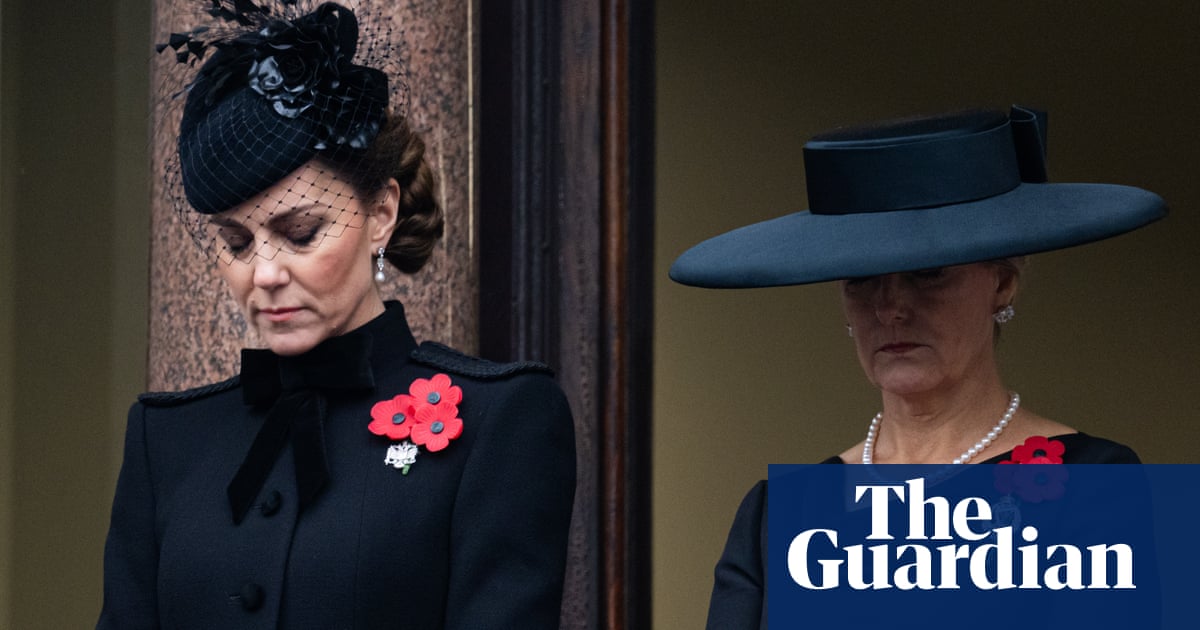Crowds fell silent at war memorials in villages, towns and cities across the country on Remembrance Sunday as generations gathered to commemorate lives lost in conflicts.
In Whitehall, the Princess of Wales joined King Charles to honour the fallen, after a year in which they both revealed they had been diagnosed with cancer. A two-minute silence was led by the king, who was the first to lay a wreath at the Cenotaph.
An unprecedented eight former prime ministers took part in commemorations in central London, along with Keir Starmer and Kemi Badenoch, who laid a wreath for the first time.
In Northern Ireland, the first minister, Michelle O’Neill, became the first Sinn Féin politician to take part in a formal Remembrance Sunday ceremony at Belfast City Hall. O’Neill said her attendance was a demonstration of her determination to fulfil her promise to be a “first minister for all”.
A message on the wreath she laid at Belfast Cenotaph read: “As first minister, I wish to take our society beyond old limits, to build bridges and to a shared future together. Today I remember all lives lost in the horror of war and conflict – past and present.”
About 10,000 veterans marched past the Cenotaph in Whitehall on Sunday, representing 326 different armed forces and civilian organisations for the Royal British Legion, the charity behind the annual poppy appeal.
Among the youngest of those marching were about 95 young people from Scotty’s Little Soldiers, a charity supporting children who lost a parent serving in the armed forces. They walked past the war memorial wrapped in black and yellow scarves. A group of Chelsea Pensioners received a loud cheer as they marched down Whitehall during the Royal British Legion event.
The closest Sunday to Armistice Day is used to commemorate the moment that fighting stopped at the end of the first world war in 1918. Another two-minute silence will be held on Monday at 11am, 106 years after that war ended.
This year coincides with the 80th anniversary of the D-day landings and the commemorations had a particular focus on remembering the sacrifices of those who took part.
A dwindling number of veterans remain from the second world war and just 11 are understood to have attended events at the Cenotaph this year. Among them was Christian Lamb, 104, who mapped the Normandy beaches for D-day troops and was awarded France’s highest honour this year for her work from an office in Whitehall.
Those taking part in the events in central London went through airport-style security but the day passed without incident. The measures followed last year’s unrest on Armistice Day when far-right protesters went to “defend” the Cenotaph while a march against Israel’s bombardment of Gaza took place.
Crowds lined Whitehall behind barriers, including many wearing service medals. Large screens were erected so they could watch the proceedings.
The Princess of Wales was watching from a government building balcony overlooking the Cenotaph in her second public appearance of the weekend to mark Armistice Day. It is the first time she has attended public appearances on two consecutive days since her cancer diagnosis.
The Prince of Wales laid a wreath after his father. He said last week that 2024 had been “brutal” and “probably been the hardest year in my life”, with his wife and father both diagnosed with cancer.
Nigel Farage and the Green party co-leader Carla Denyer also watched from balconies. Only parties with six or more seats in parliament and the largest party from each of the devolved nations lay a wreath.
The queen did not attend as she was recovering from a chest infection. A wreath was laid on her behalf by her equerry, Major Ollie Plunket of The Rifles, as she watched the ceremony on television at home in Wiltshire.
The secretary of state for Northern Ireland, Hilary Benn, was at the annual Remembrance Sunday commemoration at Enniskillen, to remember not just the war dead but the 12 people killed and dozens injured after an attack in November 1987, minutes before a Remembrance Sunday ceremony was due to start.
In Edinburgh, the first minister, John Swinney, laid wreaths at the Stone of Remembrance outside the city chambers. Speaking before a service to commemorate the fallen, Swinney said he would be particularly thinking of his uncle, Cpl Tom Hunter, a marine who died in Italy in April 1945. Hunter was posthumously awarded the Victoria Cross after making himself a target to save his troops from German gunfire.
“On Remembrance Sunday I remember particularly all those who lost their lives, but especially my late uncle,” he told PA Media.
“He was 21 years of age. He laid down his life to protect his troop and consequently he was posthumously awarded the Victoria Cross, the highest award for bravery in the United Kingdom.
“Although that award was given to my late grandmother and my late grandfather, it was of limited comfort to them because they had lost their son, my mum had lost her brother, and her brothers had lost their brothers too. We remember fondly the sacrifice he made so we could live in freedom.”

